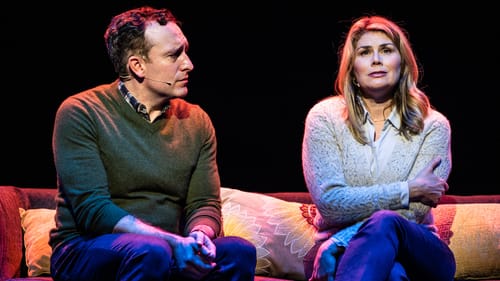Stay in the Loop
BSR publishes on a weekly schedule, with an email newsletter every Wednesday and Thursday morning. There’s no paywall, and subscribing is always free.
They oughta know
The Kimmel Cultural Campus presents the national tour of Jagged Little Pill: The Musical

When Alanis Morissette released Jagged Little Pill in 1995, the album became an instant cultural touchstone. The new musical bearing the same name, now at the Academy of Music as part of a national tour, wants desperately to repeat that phenomenon.
Crafted by Academy Award-winning writer Diablo Cody (Juno) and Tony Award-winning director Diane Paulus (Waitress, Pippin), Jagged Little Pill: The Musical retrofits Morissette’s angsty yet profound songs to a contemporary narrative. Anthems of the 1990s take on diegetic weight as they come to speak for a host of hot-button topics, including drug dependency, sexual assault, and suburban isolation in the digital age. The subject matter is relentlessly topical, the scenes hashtag-worthy.
Addiction, alienation, and pressure
Even the plot, despite Cody’s slick skill for pithy dialogue, focuses less on character development and more on messaging. The Healy family at the center of the drama represents a compendium of contemporary societal woes. Matriarch Mary Jane (understudy Lani Corson at the reviewed performance), a Connecticut supermom, struggles privately with opioid use disorder, while her husband Steve (Chris Hoch) turns to hardcore pornography for comfort. Their popular and athletic son, Nick (Dillon Klena), feels crushed by the pressure of living up to his golden-boy status. Their adopted daughter, Frankie (Lauren Chanel), feels alienated as a young Black woman raised in a predominantly white community.
The central scenario allows for some musical creativity, and Tom Kitt’s orchestrations cleave Morissette’s rock sensibility to a more traditional Broadway sound. “All I Really Want” suits the ever-widening chasm in Mary Jane and Frankie’s relationship, as mother and daughter bump up against the expectations of their roles. The clarion-voiced Klena turns “Perfect” into a wrenching personal exploration of Nick’s fear of failure.
Very serious issues
But in trying to check every box on the list of very serious issues, some get the short shrift. Cody and Paulus address the crime of rape, and the persistence of rape culture, with frankness and sensitivity through the character of Bella (Allison Sheppard), a working-class girl who faces doubt and derision after accusing a wealthy classmate of assault. Sheppard conveys the complicated emotions of a survivor with depth and poignancy.
Other subjects are not as pristinely handled. Cody’s libretto focuses more on Mary Jane’s experiences as a white mother raising a Black child than it does on Frankie’s reality, both inside her family and in her environment at large. Frankie’s on-again, off-again relationship with Jo (Jade McLeod), who feels unaccepted as a queer person in a heteronormative world, could be explored with more complexity. (The production garnered some controversy over its portrayal of Jo’s gender identity during its Broadway run, and while the character of Jo is referenced with she/her pronouns here, McLeod is a nonbinary actor.)

Corson crafts a compelling portrait of a woman in crisis, but the libretto drags its feet in tying Mary Jane’s addiction to an unresolved personal trauma. While “Uninvited” is a good musical choice to portray the vicious cycle of dependency, the cheesy choreography by Sidi Larbi Cherkaoui, in which Mary Jane wrestles with a doppelgänger version of herself, feels like an extended addiction cliché.
The palatability problem
The scene is indicative of Paulus’s directorial style. She abhors private moments, and there is rarely an opportunity for a character to have a moment of self-discovery without the chorus busting in. This strategy occasionally produces a guffaw—as when the ensemble starts parkouring off the breakfast table during what should be a tense family moment—but it mostly underscores the busyness of a maximalist musical that is trying to say and do too much. The result is frequently all flash, no catharsis.
This is not to say that Jagged Little Pill isn’t enjoyable. Often, that’s exactly what it is. The sleek production catches the eye with pulsing lighting design by Justin Townsend, creative projections from Lucy MacKinnon, and 90s-retro costumes by Emily Rebholz. (Everything old is new again.) Yet this palatability is also a problem for a show that should strive to make its audience uncomfortable. In 1995, at 21, Morissette was not afraid to shove hard truths in the public’s face. This Jagged Little Pill goes down too easily.
What, When, Where
Jagged Little Pill: The Musical. Written by Diablo Cody and Alanis Morissette, directed by Diane Paulus. Through January 15, 2023, at the Academy of Music, 240 S. Broad Street, Philadelphia. (215) 893-1999 or kimmelculturalcampus.org.
Accessibility
Masks are optional.
There will be an audio-described and ASL-interpreted performance on Friday, January 13. The Academy of Music is a wheelchair-accessible venue, with accessible seating locations available in advance.
Sign up for our newsletter
All of the week's new articles, all in one place. Sign up for the free weekly BSR newsletters, and don't miss a conversation.

 Cameron Kelsall
Cameron Kelsall